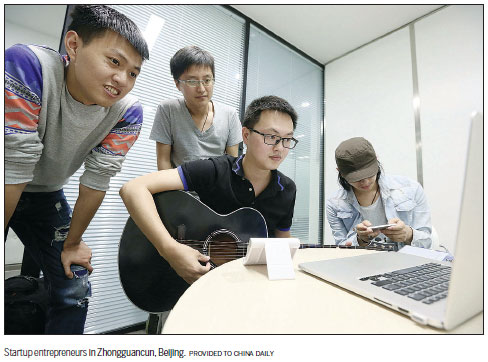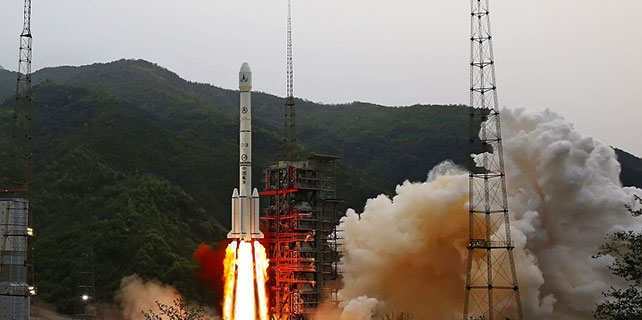Growing future money trees

On Aug 6, 2015, the State Council, China's Cabinet, approved the establishment of national entrepreneurship investment funds. The government has dedicated capital of more than 2.1 trillion yuan to fund VCs and startups, as reported by Zero2IPO. This funding is being used to support about 780 startup funds set up by central agencies and local governments across the country.
For example, the Beijing Zhonghai Investment Management Co, located in the high-tech mecca of Zhongguancun, manages approximately 6 billion yuan - 5 billion from the local Haidian district government and 1 billion from the central government, according to Wang Hua, deputy general manager.
She says: "The Haidian guidance fund is not looking for a return. What it wants to do is support high-tech, small-scale companies, especially those with their own intellectual property rights. The key is whether the company can contribute to Haidian."
But, she goes on to note: "The firms we invest in must get private money, too. In every area, the government fund occupies about 25 percent, very much less than 50 percent. What the government is doing is giving guidance about what area private capital should pay attention to."
On the other hand, Zheng Yi, a partner at Beijing-based VC Aqua Ventures, says there are restrictions on taking government funding.
"We tried to raise some local government money in our second fund, but the government fund has many very strict limitations," Zheng says. "In particular, you have to invest in the local area. I understand the purpose from the government side, but internet businesses can grow only in some areas of China. In Beijing, it might be OK. But, you do not find any good internet companies in Gansu, Qinghai or Shanxi, even though those provinces have huge funds."
Incubators and startup parks that help startups with mentoring, services, links to investors and office space are also getting government backing. Zhang Jinsheng, chairman of TusStar, the incubator in Tsinghua University Startup Park, says his organization provides the companies with "support of many kinds - legal, financial accounting. We link them with mentors from the faculty, famous industry or financial experts, and strategic partners. We buy equity shares of less than 20 percent."
He emphasizes that TusPark is a separate legal entity and must make a profit.
Zhongguancun is leveraging the talented people coming out of the many universities in northwest Beijing, to become the leading world competitor with Silicon Valley. Elsewhere, Shanghai is leading in financial technology startups and South China's Guangdong province specializes in linking new technology to manufacturing. However, the model will not work everywhere.
Technology clusters are just a part of China's development strategy, other government programs support various types of development. For example, agricultural reform is encouraging migrant workers to return to their homes to start businesses.
The Made in China 2025 strategy is pushing industrial transformation. On March 28, the People's Bank of China, the Ministry of Industry and Information Technology and three financial regulators announced policies encouraging banks, bond and stock markets, and insurance companies to boost investment in the real economy and industrial upgrading, according to Caixin Global.
Asked about the danger of government VC funds misallocating or wasting capital, Wang Jun, of Kinzon Capital, says: "I'm not worried that much. In general, there is progress from the government perspective. What I'm seeing is that most of the government money is going into professionally managed funds. They are very good professionals, the top venture capital firms in China. They get the money from the government and from institutions and then they allocate that money to market-driven venture funds. Their pay is based on the performance of the VC firms."
But Zheng, from Aqua Ventures, believes the current VC boom is definitely a bubble: "A lot of people saw the 100 times or 1,000 times return from Momo, Didi, or Toutiao and have jumped into putting money into venture capital.
"At the same time, a lot of younger rich Chinese don't like real business. They don't want to run their fathers' firms. They like to do investments so they raise money from their parents or their parents' friends, but they are just playing games in this field."
But Liu Bo, general-manager of TusStarVC, who works with many young startups, believes the current generation of youth is more hard-working and professional, in terms of better education and broader views.
Starting a business anywhere in the world is hard. Niu Hu, a senior vice-president at Huarong Securities, says: "Many of my classmates from business school started companies in Zhonguancun, but few of them existed for more than three years."
Liu agrees: "Lots of people tried investing in startups in the last two years, and they found it is not easy. Most startups in China fail within 18 months."
"In China, I see a lot of young managers working for an investment bank for 2-3 years, then coming out and starting their own fund, raising $20-30 million. Do you think these people have the right skills?" says Gu of KPMG.
davidblair@chinadaily.com.cn









